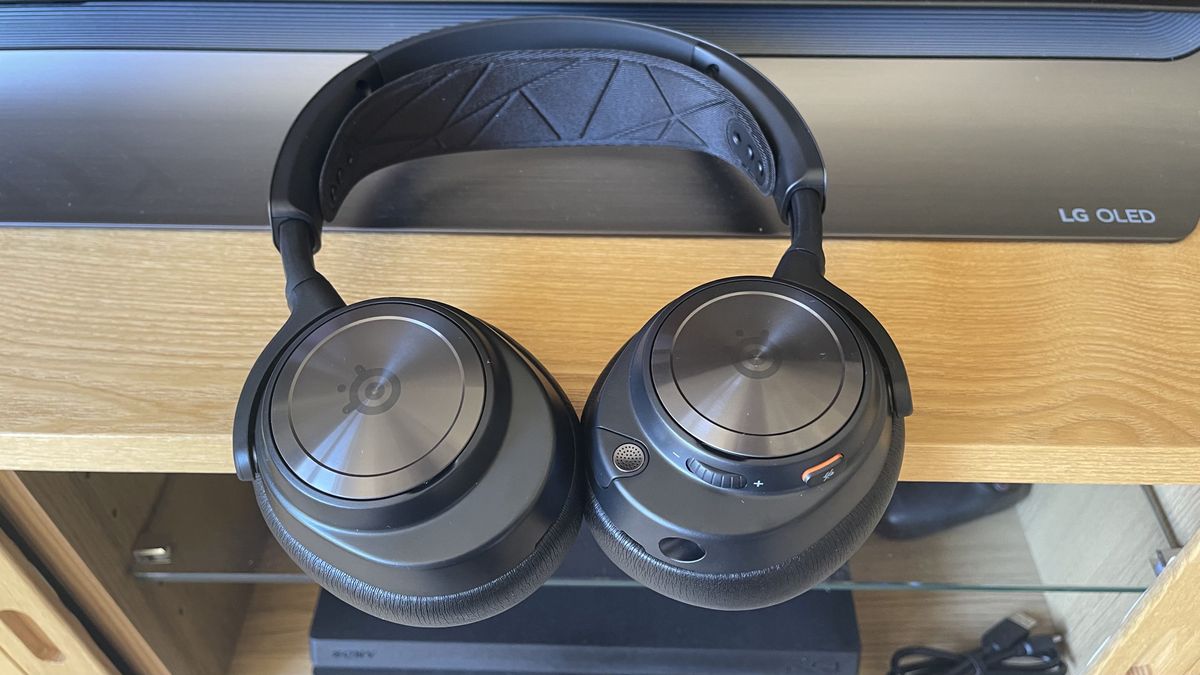12DOVE Verdict
The SteelSeries Arctis Nova Pro is a new wired flagship from the dominant force in gaming headsets. The design and build are excellent, and provide supreme comfort, while the audio is of an incredibly high-standard, adding more bass to that exquisite Arctis gaming audio we know and love.
Pros
- +
SO comfortable
- +
Familiar Arctis sound, now with more bass
- +
Useful GameDAC controls
Cons
- -
Awkward cable situation
Why you can trust 12DOVE
The release of the Steelseries first wave of Arctis headsets in 2016 is a hallowed day for gaming audiophiles, up there with TIdal’s first public alpha and the release of a Brian Eno album you’ve never listened to. The Arctis range has been the big dog of gaming audio for years now, hoovering up ‘best gaming headset’ awards every time it refreshes its lineup. There is, then, some considerable expectation on this new $250/£250 flagship model, appropriately enough called the Arctis Nova Pro.
Alongside its wireless stablemate (our review of that, this model is the first to move away from that famous ski-goggle headband since the first Arctis 7s dropped six years ago, and the visual design is notably different from previous iterations. However, it’s still shooting for the moon with a GameDAC base station, impressive specs, and a high price point. We’re here to find out if the Arctis can still freeze out the opposition and become one of 2022's candidates for the best gaming headset, or whether you should just let it go.
Design & features
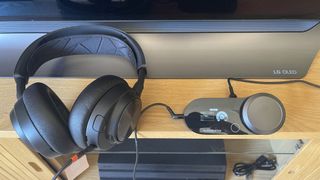
Previous models of Arctis were defined by a distinctive elasticated band that wrapped around the headband frame’s upper, and then back underneath to create a taut surface that sat on your head, keeping the metal frame out of contact. That’s all changed now, and in its place is a smaller headband insert that attaches to the headband frame’s inner surface on a set of adjustable press studs. The principle’s the same - the fabric is holding the tension and keeping your head away from the harder headband surface - but in look and feel, it’s a definite change.
In fact, it might be even more comfortable than the older designs of Arctis 7s, 9s, or Pros. But that’s probably as much about the perfectly judged clamping force provided by the earcups, and the absolutely exquisite cushioning around them.
Seriously, this thing feels like something you’d be handed on an Emirates first-class flight. The pleather around its memory foam cushions is the softest this tester’s ever felt on a gaming model, and the overall look and feel harks back to the glory days of the Bose TriPort.
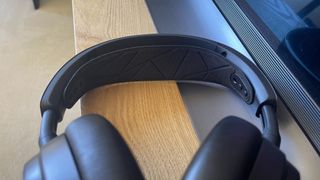
The magnetised, swappable earcup plates are retained, but now shrunk down and finished in brushed metal with a subtle anodised SteelSeries logo on each side. The other big change is in the physical controls: the chat mix volume roller, which we’ve come to miss on every other headset when we’re not using an Arctis, is gone and lives only in the GameDAC’s menus now. A shame, definitely, but the mic mute and volume scrollers are preserved and inlaid thoughtfully into the earcup.
The mic, never a strong point of Steelseries, is once again retractable and there’s a foam pop guard supplied in the box. When fully retracted, you’d barely notice there was a mic on this model at all.
In overall looks and comfort, it’s a step up from what was already a supremely comfortable Arctis Pro. While the latter always looked a bit ‘function over form’, now Steelseries’ product team delivers something that looks like it costs $250/£250, and feels astoundingly comfortable.
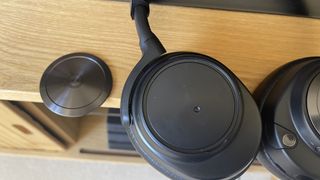
Performance
Sound quality is predictably excellent, given that it’s a flagship Arctis model running through a GameDAC. It retains Steelseries’ characteristic EQ quality, pushing higher mids upwards to the fore and keeping the bass within those 40mm drivers tamed. While a lot of pre-2016 high-end headsets went all out on low-end and marketed the size of their drivers as a major beat (remember the ‘Angry Birds’ Asus ROG cans?) the Arctis range always kept the EQ response neutral, to the benefit of every game you pumped through them.
That’s true here too, although the sound characteristic is definitely different now. It almost sounds as if it’s been tuned at the hardware level for a scooped EQ and then flattened out again at the firmware level. Cycling between the flat and ‘smiley’ EQ profiles on the GameDAC, the latter seems to produce a more natural tone, while the flat profile sounds like there are algorithms doing some work. No matter - both sound great, and there’s definitely more low-end to play with now.
That’s chiefly down to the leatherette material around the earcups, which provides really good noise isolation and creates tight little chambers around your ears where lower frequencies can sing out.
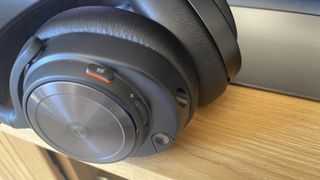
You can still easily rein it back on the GameDAC, which is full of other features from input selection to chat mix, mic gain, and even a friendly onscreen tutorial, and restore more of a classic Arctis flat eq for the likes of CSGO where positioning cues it vital. But for sheer enjoyment, giving the bass license to let down its hair sounds great for music and single-player games.
Mic quality sees a small improvement too. It’s not anything close to a dedicated streamer mic - this is still Steelseries we’re talking about here - but it’s a slight improvement on previous scratchy Arctis mics. The foam pop cover helps to minimise plosives, but it still doesn’t have the body or richness of something like the Corsair HS80 RGB Wireless.
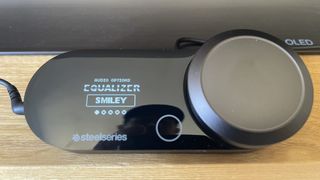
Should you buy the SteelSeries Arctis Nova Pro headset?
It succeeds at just about everything it tries, this Nova Pro. Our only significant criticism is in the cabling arrangement itself. The headset to GameDAC 3.5mm cable is pretty short, just 1.2m. That’s not a massive hassle in a gaming PC desktop setup, and deploying it as one of the best PC headsets for gaming, but it takes some thinking about if you’re using it with a console. It just doesn’t feel like a very elegant solution for a headset commanding this price - something braided and longer would have been more appropriate. Of course, if the idea of it really gets under your skin you can always go for the wireless model.
You’re certainly getting your money’s worth, even at this high price. The unit itself looks spectacular, the GameDAC is well-designed and easy to use, and the comfort level has to be worn to be believed.
We do have some slight concerns about wear and tear over time, though. The plastic hinge connecting the headband to the earcup already has some play to it in our review sample, and previously this part was made from aluminium so the Nova Pro’s obviously prioritizing hitting that extremely light 296g weight over long-term durability. Time will tell how that one plays out.
The bottom line right now is that if you’ve got the budget for it, you’ve got a new first-choice headset in the wired market. If you can live with its cable situation and the potential for some wear and tear down the line, you’ll be rewarded by great sound, first-class airline looks, and an elegant base station that does it all.
How we tested the SteelSeries Arctis Nova Pro
All our headsets go through a conveyor belt of Spotify tunes containing warm classic jazz, oddly mixed Smashing Pumpkins tracks, and the kind of dubstep that would have raised the roof/accompanied a new Assassin’s Creed reveal circa 2011. That was just as true of this Nova Pro as any, which we also ran direct A/B comparisons on with the 2019 Arctis Pro Wireless and Arctis 9x. In-game, we sampled the ambient noises of Cyberpunk 2077’s Night City and treated our eardrums to the unbridled chaos of unranked Overwatch servers.
You can read more about how we test gaming headsets as well as how we make all our recommendations in the full 12DOVE Hardware Policy.
To refine your wireless headset choice by console platform, browse our guides on the best best PS5 headset and the best Xbox Series X headset.
Phil Iwaniuk is a multi-faceted journalist, video producer, presenter, and reviewer. Specialising in PC hardware and gaming, he's written for publications including PCGamesN, PC Gamer, GamesRadar, The Guardian, Tom's Hardware, TechRadar, Eurogamer, Trusted Reviews, VG247, Yallo, IGN, and Rolling Stone, among others.

After struggling to make sequel-sized changes, fans think Blizzard might retire the '2' in Overwatch's name based on Season 16 leaks

Valve leads considered making a "mediocre" game before Half-Life to build the team up, but original marketing exec said "if you do that, the company will fail"

Take-Two won't begin marketing GTA 6 until it's closer to release: "The anticipation for this title may be the greatest anticipation I've ever seen for any entertainment property"
